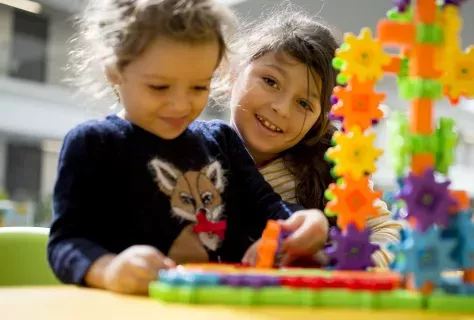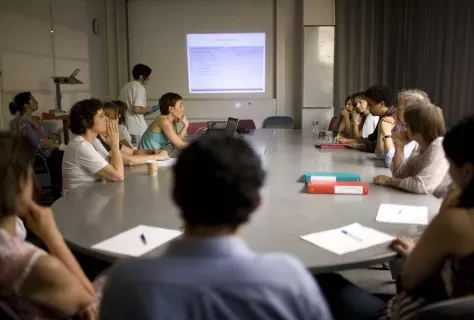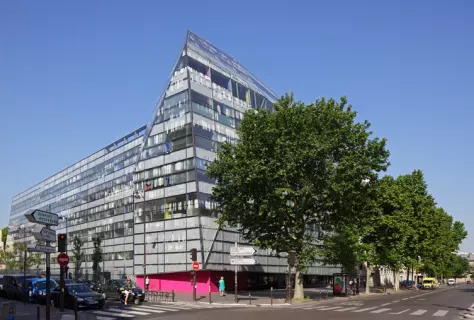
Institut Imagine participates in the Pasteur Paris-University (PPU) program for the recruitment of international doctoral students in collaboration with several Parisian universities.
Who is this program for?
It is intended for students who hold a Master's degree (or equivalent) from a university outside France, and who have not worked or resided in France for more than 12 months in the 3 years prior to their recruitment (October 1st, 2026).
The selection of the PPU-IMAGINE program is organized by Institut Imagine and selected students carry out their research in one of Institut Imagine lab.
Why join Institut Imagine?
By joining the program, students gain access to a stimulating and ideal environment for the training and career development of young researchers.
In addition, students can expand their knowledge by taking specialized courses and benefiting from an extensive seminar program with speakers from around the world. Students enrolled in the PPU-IMAGINE program will have access to the following activities or workshops offered by the PPU program:
- Oral presentation workshop
- Journal Club
- Scientific Integrity and Ethics Training courses
- French language courses
- Organization of the annual retreat
- Other PPU social activities (Luncheons)
Students are selected on a competitive basis. Candidates are first pre-selected by the host laboratories and their joint applications are then presented to a selection committee.
Doctoral students selected to follow this program at Institut Imagine will benefit from a specific 3-year employment contract with a net pre-tax monthly salary of ca. €2,300 (including health insurance, mutual insurance and provident funds) and the possibility of accommodation at the Cité International Universitaire de Paris.
At the end of their studies (usually three years), students support their PhD according to European guidelines.
Application process
1. Call for applications: the 2025-2026 call for applications begins on September 1st, 2025, and ends on October 20th, 2025. Please see below for the proposed PhD research projects. Candidates may contact potential host laboratories for further information.
Please note that candidates can only apply for a maximum of 2 PPU-IMAGINE projects.
2. Matching between project leaders and candidates from October 21th, 2025, to November 12th, 2025: the project leader selects 1 candidate from the applications received; the project leader and their candidate finalize their joint application by November 12th, 2025. Please note that to carry on with the selection process (joint application), candidates must choose one single project.
3. Pre-selection of candidates: applications are sent to a jury, which ranks and preselects the applications. Candidates will be informed of the status of their application and any follow-up action as of mid-December 2025.
4. Interview week: candidates will be invited to come to Institut Imagine for interview sessions between February 3rd, 2026 and February 5th, 2026. Candidates will then be informed of the follow-up action to their application.
5. Beginning of the thesis: selected candidates are expected to start their PhD at Institut Imagine on October 1st, 2026. Please note that the selected candidates must be affiliated with the university/doctoral school of their host laboratory.
Projects
Candidates are invited to apply via our PPU-platform for a maximum of 2 projects of their choice. The project proposals may be downloaded using the links below.
- An iNnovAtive EpigenoMe edIting Approach to beta-hemoglobinopathies - Project leader: Annarita MICCIO - Laboratory of Chromatin and gene regulation during development
- Evaluation of the oncogenic cooperation between KIT and FAS genes in Mastocytosis and identification of alternative FAS transcripts involved in mastocytosis pathophysiology using “targeted long reads sequencing”. - Project leader: Leila MAOUCHE CHRETIEN – Laboratory of Molecular mechanisms of hematological disorders and therapeutic implications
- Dissecting the regulatory network of genes that escape X chromosome inactivation - Project leader: Agnese LODA - Laboratory of Epigenetics and sex differences in development and disease (new research group coming in January 2026)
- Targeting PI3Kd: Mechanistic Insights into Immune Dysregulation and Therapeutic Modulation - Project leader: Sven KRACKER - Laboratory of Lymphocyte activation and susceptibility to EBV Human genetics of infectious diseases
- Disentangling the human genetic determinants of long COVID using innovative and cutting-edge approaches to analyze whole exome/genome sequencing data. - Project leader: Aurélie COBAT - Laboratory of Human genetics of infectious diseases : complex predisposition
- Functions of Reelin in cortical astrocyte development - Project leader: Pierre BILLUARD - Laboratory of Genetics and development of the cerebral cortex
- Molecular and cellular bases of a new neurodevelopmental disorder with impaired cerebellar development using human cellular models and zebrafish - Project leader: Vincient CANTAGREL - Laboratory of Developmental Brain Disorders Laboratory Translational Research in Neurological Diseases
- Somatic mosaicism and clonal dynamics in the human cerebral cortex - Project leader: Sara BIZZOTTO - Laboratory of Somatic mosaicism in neurodevelopment and disease
- Mechanisms underlying MYo-inositol-Dependent Dysregulation
of GUT Metabolism in rare and common diseases - Project leader: Marianna PARLATO - Laboratory of Immunology Tissue Immunity in homeostasis and Disease - Characterization of Osteogenesis imperfecta type V and Type VI : common and specific features - Project leader: Corinne COLLET - Laboratory of Molecular and physiopathological bases of osteochondrodysplasia
- Deciphering New Molecular Mechanisms and Developing Therapeutic Approaches for Craniosynostoses using Zebrafish models - co-project leades : Emilie DAMBROISE and Chris Gordon - Laboratory of Genetics of Developmental Disorders
- Monogenic etiologies of myasthenia gravis - Project leader: Paul BASTARD - Laboratory of Human genetics of infectious diseases : monogenic predisposition
- Elucidating molecular mechanisms linked to TDP-43 pathological spreading - Project leader: Sorana CIURA - Laboratory of Mechanisms and therapy of genetic brain diseases
- Understanding Darier disease using integrative mRNA sequencing and (Phosphor)proteomics to guide therapeutic repurposing - Project leader: Alain HOVNANIAN - Laboratory of Genetic skin diseases : from disease mechanism to therapy
- Genetics of autoimmune hepatitis: highlight the mTORC1 pathway - Project leader: Aude MAGERUS - Laboratory of Immunogenetics of pediatric autoimmune diseases
- Exploring somatic mutation–associated immune mechanisms shared by chronic autoimmunity and lymphoid malignancy: a study in refractory celiac disease - Project leader: Anaïs LEVESCOT - Laboratory of Hereditary kidney diseases
To apply
The call for applications is now open! Please sign in or create an account on our PPU platform following the link : click here to access to the PPU-platform to apply for a maximum of 2 projects of your choice.
If you need more information, please contact the PPU-IMAGINE Team at callapplication@institutimagine.org
Language requirements
The program is run in English and therefore fluency in English is required. Any knowledge of French is not ultimately necessary. French language courses are part of the trainings offered during the first year of the PPU-IMAGINE PhD program.
To see more!
The videos below feature two PPU-IMAGINE students sharing their insights on the PPU-IMAGINE program. It might offer some useful takeaways. We recommend giving it a look!



